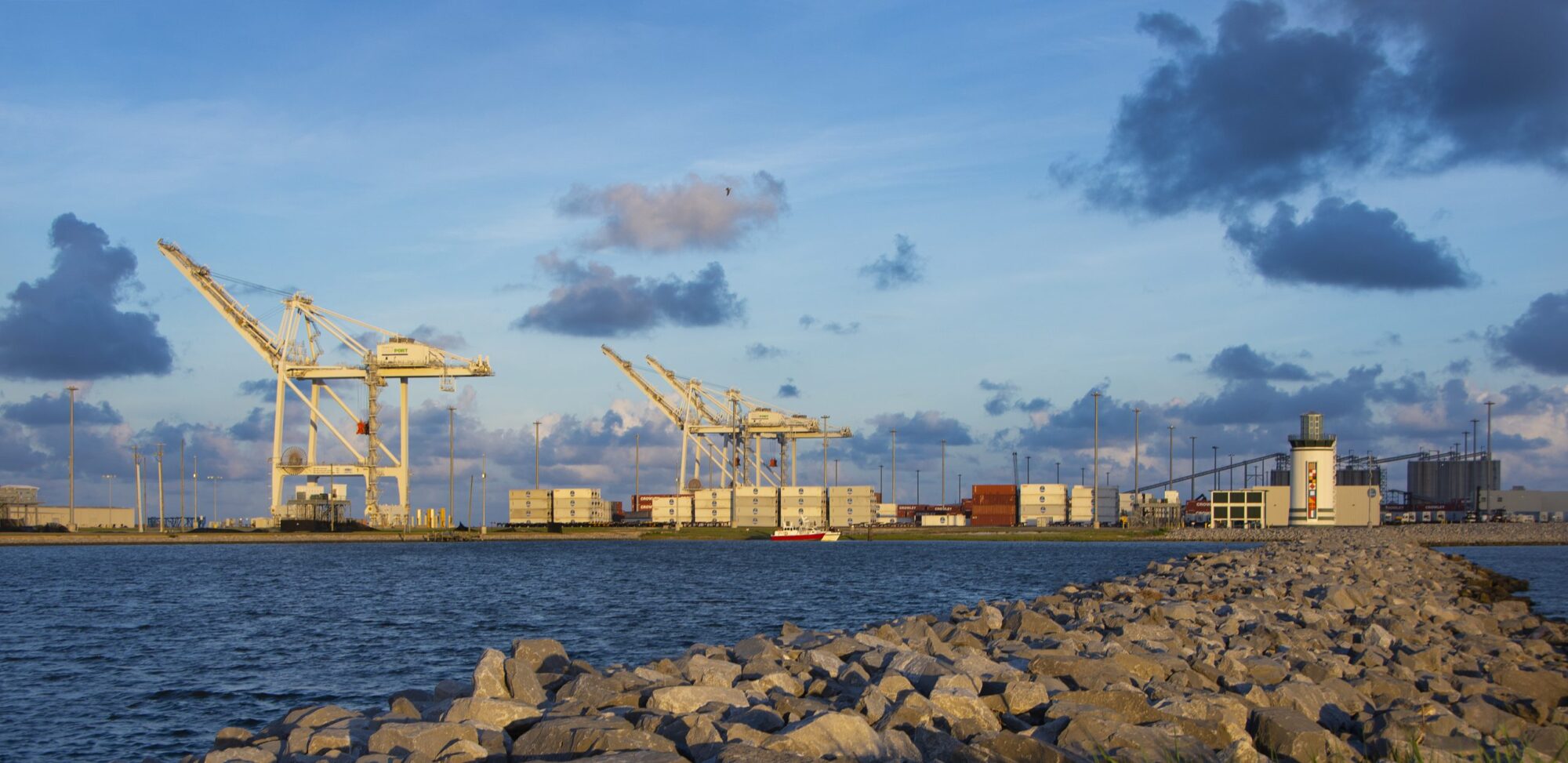
Photo from ShipMSPA
- Gulfport’s port could be potentially affected. A shutdown would devastate the agricultural industry, Ag Commissioner says.
Toys, cars, and food soon could be in short supply as an East and Gulf Coast port strike looms large for the first time since 1977.
The International Longshoremen’s Association (ILA) strike, slated to start October 1, could become the most disruptive strike in the U.S. economy in decades.
At the heart of the discourse
The ILA, the nation’s largest union of maritime workers, wants an increase from $39 to $69 per hour for a six-year master contract, and a total ban on the automation of cranes, gates and moving containers in the loading and unloading of freight.
The U.S. Maritime Alliance (USMX), which represents employers of the East and Gulf Coast longshore industry, has offered a bump in pay to $54 per hour.
Talks failed in June, and no talks were slated on Monday. Presidential intervention is not expected. When asked at 3 pm on September 30 for a yes or no answer to whether Vice President Kamala Harris supports interference concerning the imminent strike, her representative would not respond.
In a statement issued Monday, the ILA blamed USMX for continuing to “to block the path” towards an agreement before the contract deadline. ILA employers include container shipping magnate Maersk.
Experts predict the strike could disrupt up to $5 billion per day traded in containers in 36 ports stretching from Maine to Texas, which handle roughly half of the nation’s ocean shipping. The American Manufacturers Association said, for their part, the strike could cost $2.1 billion a day.
The economic impact of the strike could run as high as $641 million per day for The Port of New York/New Jersey, the largest port on the East Coast. The union said previously the strike would not impact military cargo shipments or cruise ship traffic.
“Nationwide, we’re looking at a $1.4 billion disruption per weekfor agriculture products,” said Mississippi Agriculture Commissioner Andy Gipson.
Magnolia State impact
“I’ve been monitoring the situation over the weekend and hoping against hope that they’d come to some deal, but it looks like it’s not going to happen, and it will have serious, immediate and long-lasting negative consequences for Mississippi farmers,” said Gipson.
In Mississippi, the only port potentially impacted by the ILA strike is Gulfport, which provides an annual economic impact of $3.8 billion to the region.
“The Mississippi State Port Authority (MSPA) has great respect for all the men and women that work at the Port of Gulfport. The MSPA is not a party to the negotiations between the United States Maritime Alliance and the International Longshoreman’s Association that could lead to a work stoppage on October 1. The Port Authority remains hopeful that the USMX and ILA will come to a mutually beneficial agreement to alleviate a negative economic impact,” according to a MSPA statement issued Monday.
Bo Ethridge, director of the Port of Pascagoula, which is not involved in the ILA plan to strike, issued this statement:
“As the impending port strike on the East Coast and Gulf of Mexico develops, we want to reassure our partners and stakeholders that Port Pascagoula remains well-positioned to continue business as usual. Due to our unique operational structure, which utilizes both union and non-union labor, we anticipate minimal to no impact on our day-to-day activities. We remain fully committed to providing uninterrupted service to all our customers and ensuring the smooth flow of commerce through our port.”
Seventy-five percent of Mississippi’s agricultural products are shipped over water, said Commissioner Gipson.
“About 30 percent of that agricultural product is shipped in cargo containers,” he said.
Gipson called 2024 “probably the hardest year that farmers have faced in terms of low prices versus extremely high inflation and input costs, and we’re hearing from financial experts that 25 percent of American farmers may not be able to farm again next year.”
“Even though our harvest is great, we’re not selling enough product,” he added.
The closure of the Port of Mobile, Alabama, which would also be impacted by the strike, would result in an immediate halt to the exporting of poultry, Mississippi’s largest agriculture business, said Gipson. After Hurricane Katrina, it became necessary to ship poultry from Mobile.
Would mitigating the situation be as simple as shifting trade from the affected Ports of Mobile and Gulfport to the unaffected Port of Pascagoula?
“No,” said Gipson. “The problem is getting people to work. Trying to staff up a whole other port is going to be difficult to do in the near term.”
September preparation
Several weeks ago, some shippers started relocating their routes to the west coast, despite the exorbitant cost.
Last week, importers scrambled to move billions in cargo before the deadline. Nearly $14 billion in trade poured into portsspecifically in New York/New Jersey, Baltimore, Norfolk, Savannah, Miami, New Orleans, and Houston, with $2.7 billion in trade arriving on Friday. Notable importers: German footwear maker Birkenstock, Ace Hardware, Anheuser-Busch, and Keurig Coffee.
Walmart is the largest importer across all threatened ports, according to ImportGenius data, followed by Ikea, Samsung, Bob’s Discount Furniture, Home Depot, Continental Tire, Hyundai, Dollar General, General Motors, Amazon, and Folgers.
Presidential Election impact?
The U.S. Chamber of Commerce released a poll showing that a majority of both registered voters (58 percent) and the general population (54 percent) supported the Biden-Harris Administration intervening and ordering the union to work and negotiate by invoking the 1947 Taft-Hartley Act.
ILA president Harold Daggett, noting the unanimous vote of its 85,000 members (50,000 would be affected) to authorize a strike, who has been critical of the Biden-Harris Administration, threatened an intentional worker slowdown in moving containers if the administration forces union workers back to the docks using the Taft-Hartley Act.
Earlier Monday, President Joe Biden said he does not plan to intervene in union action.
A ports strike could upend recent gains made in drawing down inflation and the prices paid by consumers across a diverse range of goods, giving former President Donald Trump another talking point over the key voter issue of the economy in the final days of campaigning.
The potential downfall of the pending strike was exacerbated this weekend by the far-reaching effects of Hurricane Helene, especially in Western North Carolina. Buncombe County, home of Asheville, has traditionally been a bellwether county for predicting presidential elections. As of early afternoon September 30, Vice President Harris had not issued a statement about the beloved tourist destination, nor had she weighed in on the pending port strike.
Other presidents have used the Taft-Hartley Act to end portstrikes. In 2002, President George W. Bush interrupted the 11-day shutdown of 29 West Coast ports, saying they were “vital to our economy and to our military.” President Richard Nixon used the act in 1971 to end a wave of port strikes.
“I was absolutely appalled the Biden-Harris administration has done nothing to stop the strike,” said Mississippi Ag Commissioner Gipson. “The Biden-Harris administration has allowed the worst trade deficit to exist since the 1980s. This strike is salt in the wounds of our farmers.”











